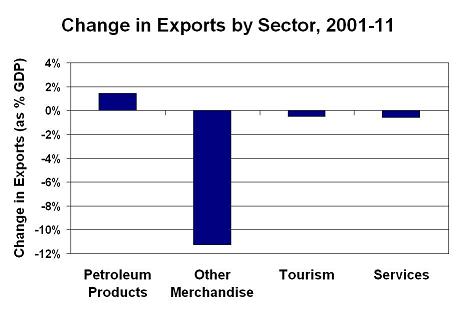The high-and-mighty vitriol which greeted Tom Mulcair’s comments last week about the downside of oil-powered currency appreciation is lamentable (repeating the over-the-top reaction to Dalton McGuinty’s similar comments a few weeks ago). Mulcair made two modest and empirically substantiated statements: the loonie is sky-high as a result of the oil boom in Alberta’s bitumen sands (I doubt you’d find a single currency trader on Bay Street who would disagree with that), and that overvaluation is causing negative side-effects on other industries and regions in Canada.
Following up on Erin Weir’s most excellent interventions, here is my column in yesterday’s Ottawa Citizen on this issue. And here is a graph that went with the column in the print edition. It shows that in the last decade, Canadian petroleum exports grew by close to 2 percentage points of GDP — fairly impressive. But Canada’s exports of everything else (manufacturing, services and tourism) declined by several times as much — and the two offsetting trends are not unrelated. No wonder Canada is mired in a large, chronic international payments deficit, even as we scrape the stuff out of the ground faster than ever.
These diatribes against anyone who even acknowledges potential downsides or side effects of the bitumen boom seem to herald a new, dangerous tendency in Canada’s political culture. Opposing a bitumen-exporting pipeline in Canada these days makes you a foreign-financed subversive. And it seems that questioning the economic effects of the bitumen export strategy makes you equally seditious. I call this “energy McCarthyism,” and it should be rejected forcefully not just by those concerned with Canada’s de-industrialization and staples dependency, but by those worried about the quality of our democracy.
Jim Stanford is an economist with the CAW. This article was first posted on The Progressive Economics Forum.
Cultivate Canada’s media. Support rabble.ca. Become a member.



